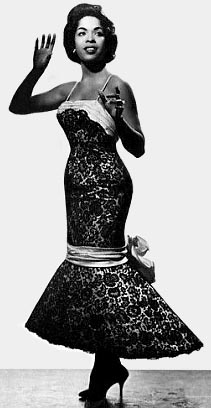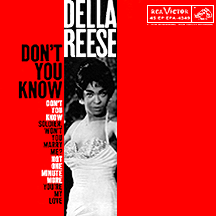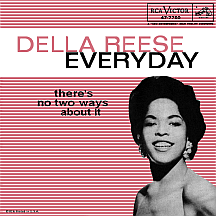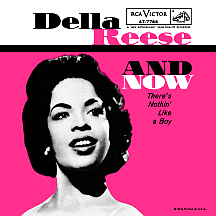DELLA REESE
Although she's a familiar actress to millions of TV viewers, Della Reese is, first and foremost, a very fine singer. Surely she considers her various show business ventures of lesser import, secondary to her faith in God (she was ordained a minister later in life). Born Delloreese Patricia Early in 1931, her earliest singing experience came as a member of the Liberty Baptist Church in Detroit. Gospel great Mahalia Jackson attended services in 1944 and was impressed by the ability of the 13-year-old vocalist. Starting the following year, Delloreese spent five consecutive summers touring with Jackson's troupe. A certain worldliness is gained when one is a successful entertainer and she's no exception, having grown up in trying circumstances and given in to her share of temptation as an adult. Turning 18 in 1949, she embarked on a career in secular music...but only after coming to grips with a difficult situation at home.
Her mother, Nellie Mitchelle (born of Cherokee Indian heritage), passed away that year. Relations with her black father, Richard Early, were strained and, with no further legal reason to stay, she moved out. Vermont Taliaferro, a common laborer and member of her church that she had known for several years, became her husband in July 1951. After just 17 months of marriage he deserted her, leaving the childless singer free, and of the right mindset, to follow her dreams. To make her professional name more "marquee friendly," she essentially split her ten-letter first name down the middle. Continuing on a spiritual music path, she performed for several months with The Meditation Singers while working several odd jobs (cab driver, receptionist, lounge hostess at a bowling alley) and finally made a difficult decision; well-suited as she was to just about any style of singing, she set out to find acceptance as a jazz artist.
A local promoter named Al Green got her an audition in New York City with Al Hibbler's manager and Savoy Records exec Lee Magid, who was certain he'd found a "female Hibbler." He took her to the Baby Grand nightclub where she sang a couple of songs, wowing the attendees in the process. In early 1954 she made her first record, "Yes Indeed" (trumpeter Sy Oliver had composed the song and duetted with Jo Stafford on bandleader Tommy Dorsey's '41 hit version), for a small local label, Great Lakes. She performed with the famous "Tuxedo Junction" trumpeter and bandleader Erskine Hawkins and signed with Jubilee Records later in the year, debuting the following spring with a version of Cole Porter's "In the Still of the Night" that merged her brassy personality and impressive vocal range. Nightclub and concert work was steady, but it took about two years for her career to reach the next level. "And That Reminds Me," composed by the enigmatic Camillo Bargoni as "Autumn Concerto" (George Melachrino had an instrumental U.K. hit with it in the fall of '56, while several U.S. versions stalled), came to life by way of Al Stillman's lyrics and Della's tenderly escalating performance set to an understated arrangement by Billy Rock. It was a hit in the summer and fall of '57 despite strong competition from Kay Starr (whose version was titled "My Heart Reminds Me").
Though several years had passed since short-term hubby Taliaferro's exit, Reese finally obtained a divorce in April 1958. Two months later, a big-screen bartender said to Julius LaRosa, "You're just in time for Della Reese," after which she applied her impressive vocal style to a rather undistinctive song, "Lonelyville." So went a scene in Let's Rock! starring La Rosa and Phyllis Newman, a showcase for several teen rockers (Danny and the Juniors, The Royal Teens, Paul Anka) and one formidable R&B star (Roy Hamilton). Appearances on TV variety shows (she was on The Ed Sullivan Show many times) gave her wider exposure, yet only "Sermonette," in early '59, made an appearance on sales charts prior to the expiration of her Jubilee contract.
RCA Victor signed the singer right away, determined to use the company's considerable resources to make her a major star. "Musetta's Waltz" from Giacomo Puccini's 1896 opera La Bohème provided the melody for "You," bandleader Sammy Kaye's 1952 hit with vocalist Tony Russo; Della's RCA debut, "Don't You Know," provided the Puccini tune with a different set of lyrics by songwriter Bobby Worth. As emotional a "big ballad" as there ever was, her recording was an across-the-board smash (a million seller, number one on Cash Box, number two on Billboard and number one on the R&B charts).
Reese remarried just as her single peaked; the ink on accountant Leroy Gray's Mexican divorce from his previous wife hadn't yet dried. Marriage number two for Della was more of an extended hookup, quite unlike the first, and ran its course wthin a few years. She made amends through music; the gorgeous "Not One Minute More," penned by Don Robertson, Hal Blair and Lou Dinning of The Dinning Sisters, was a third big hit for Della in early 1960. Working with the Neal Hefti orchestra, she followed with "Someday (You'll Want Me to Want You)," a passionate rendition of the 1940s standard written by Jimmy Hodges. Producers Hugo Peretti and Luigi Creatore, working with other RCA staffers, penned "Everyday" and the fall '60 hit "And Now." She received a Grammy nomination for Best Vocal Performance, Album, Female for her self-titled RCA debut, losing to perennial favorite Ella Fitzgerald (for Mack the Knife - Ella in Berlin). One other nomination many years later yielded like results. But there would be other triumphs in store for Miss Reese.

Emotionally dramatic ballads like Johnny Lehman and Stan Lebowski's "The Most Beautiful Words" were typical of many singles for RCA Victor, while album material generally consisted of vintage standards. She elbowed into Ella's territory with "Won'cha Come Home, Bill Bailey," featuring the orchestra of Mercer Ellington (son of the great Duke), but record sales nearly ground to a halt shortly afterwards. For some it would have been enough to spend a few years in the spotlight before fading away, but Della was driven to reach greater heights; a favorite of Johnny Carson, she made frequent guest appearances on The Tonight Show after he took over permanent hosting duty in October '62. Joining the roster of ABC-Paramount Records in 1965, Della had a sizeable Easy Listening hit with "After Loving You," made popular by country star Eddy Arnold three years earlier during his own initial shift into the E-Z market. On Ervin Drake's "It Was a Very Good Year," in the fall of 1966, she took a bolder big band approach than Frank Sinatra had on his gently textured hit version of the song from earlier that year; each take is brilliant in its own way.
In 1968, at age 36, the diva dove headfirst into acting on an early episode of TV mogul Aaron Spelling's trippy crime series The Mod Squad. Then the opportunity came up to host her own hourlong syndicated talk show; Della premiered in June 1969, running at widely differing times of the day and night in various cities. Her sidekick was comedian Sandy Baron (he'd broken into the business as a songwriter with "The Writing on the Wall," a 1961 hit for Adam Wade). Della had many singers and musicians as guests, often welcoming acts the bigger talk shows didn't typically book, among them "Big Mama" Thornton, Molly Bee, Tommy Boyce and Bobby Hart, The Impressions, The Dells, The Four Freshmen, Billy Preston and girl group The Mirettes, in addition to the era's top stars. Her close friend, comedian Redd Foxx, frequently dropped by, a few years prior to his star turn on TV's Sanford and Son.
You wouldn't think Della's acting career could possibly overshadow her fame as a singer, especially considering she was over 40 before the offers in television started pouring in. Besides numerous one-shot parts on episodes of Police Woman, McCloud and Medical Center and comedies like Welcome Back, Kotter and The Love Boat, she was a regular on the sitcom Chico and the Man with Jack Albertson and Freddie Prinze from 1976 to '78, remaining with the series as it continued after Prinze's untimely death in January 1977. Della's greatest success came in 1994 when she co-starred with Roma Downey on the long-running CBS drama Touched By An Angel, resulting in two Emmy nominations for her role of Tess on the high-rated series. One thing was obvious to fans: she performed the show's opening theme, "Walk With You," which can certainly be added to the durable Della Reese's list of hit songs.
NOTABLE SINGLES:
- Yes Indeed - 1954
- In the Still of the Night - 1955
- Time After Time - 1955
- And That Reminds Me - 1957
- Sermonette - 1959
- Don't You Know - 1959
- Not One Minute More - 1960
- Someday (You'll Want Me to Want You) - 1960
- Everyday - 1960
- And Now - 1960
- The Most Beautiful Words - 1961
- Won'cha Come Home, Bill Bailey - 1961
- A Far Far Better Thing - 1961
- After Loving You - 1965
- It Was a Very Good Year - 1966
- Compared to What /
Games People Play - 1970




